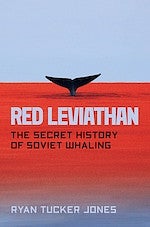
Experiential Learning | Research & Innovation | Community Impact | Career Preparation | Teaching Excellence | 21st Century Liberal Arts | Building Community | Good Vibes | CAS Spotlights | All Stories | Past Issues

'Red Leviathan' Explores the History of Soviet Whaling
While conducting research on the Russian fur trade, Ryan Tucker Jones kept encountering whales—both in descriptions in the archives and live ones in the field. Upon learning that the Soviet Union had conducted a massive illegal whaling campaign in the 20th century, he knew he had something important to write about.
In his 2022 book Red Leviathan: The Secret History of Soviet Whaling, the Department of History professor and Ann Swindells Chair explores the fascinating history of Soviet whalers who secretly contributed to the near extinction of endangered whale populations while also ironically providing the necessary scientific research for these whales’ salvation.

The book was shortlisted in June for the prestigious Pushkin House Book Prize, which highlights books that provide outstanding research on Russia’s history, culture and people. It also won the John Lyman Book Award from the North American Society for Oceanic History in 2022.
Jones largely conducted his research through historical archives in the former Soviet Union. He found old records of whaling trusts and memoirs of whalers and scientists—and he was able to personally interview several former whalers and whale scientists.
Jones wanted to balance what he saw to be a “cynical and reckless” crime with the complex and humane stories behind those who carried out the illegal campaign.
“They were all exceptionally generous with their information, even though I was writing a book that was not going to celebrate the whaling that had defined so much of their lives,” he says.
His findings were monumental.
“Because Soviet whale scientists had access to so many dead whales—more, really, than scientists anywhere else in the world—they were able to study the animals in exceptional detail,” he says. "Their observations led them to claim, very early on, that whales were actually exceptionally intelligent, social animals. These conclusions did not often lead Soviet whale scientists to oppose whaling, but over time they did influence the Soviet public and helped erode support for the whaling industry.”
In the future, Jones is interested in researching the environmental history of the Russian economic collapse and the relationship between humans and whales.
Learn more about Ryan Tucker Jones and his research from his 2021 appearance on UO Today with the Oregon Humanities Center.
—Bailey Meyers, ’25, is a journalism major and Clark Honors College student at the University of Oregon.
